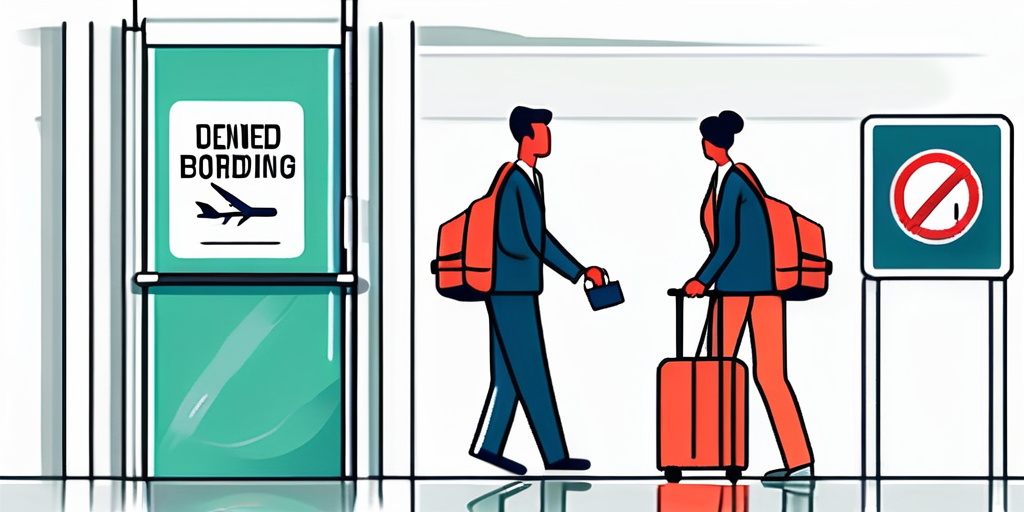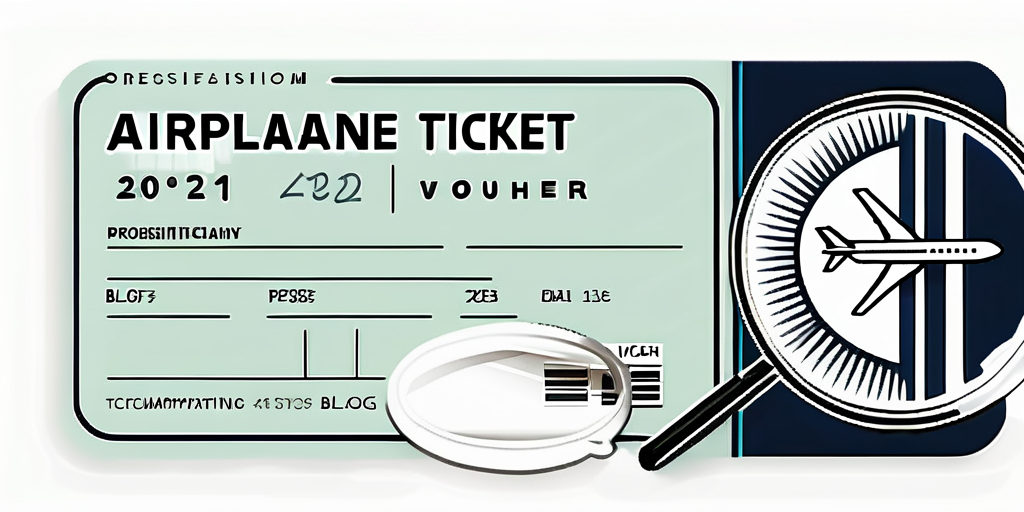Should I Accept a Voucher for Denied Boarding Compensation?
Unsure about accepting a voucher for denied boarding compensation? Explore the pros and cons to make an informed decision.
In the unfortunate event of being denied boarding on a flight, airlines typically offer passengers compensation. This compensation can come in the form of cash or travel vouchers. However, deciding whether to accept a voucher for denied boarding compensation can be a challenging decision. Understanding the various aspects of this dilemma is key to making an informed choice.
Understanding Denied Boarding Compensation
Denied boarding compensation is provided to passengers who are involuntarily bumped from their flights due to overbooking or other operational reasons. It serves as a form of compensation for the inconvenience caused. When faced with denied boarding, it is essential to be aware of your rights and the options available.
 ### The Legalities of Denied Boarding
### The Legalities of Denied Boarding
Denied boarding is regulated by laws and regulations in different countries. These rules stipulate the rights of passengers, including the compensation they are entitled to. Familiarizing yourself with these legal requirements will help you navigate the situation with confidence. It is important to know what you are entitled to and what options are available to you.
Types of Compensation: Cash vs Vouchers
When airlines offer compensation for denied boarding, they typically provide two options: cash or vouchers. Cash compensation provides immediate financial reimbursement for the inconvenience. On the other hand, vouchers offer the opportunity to use the compensation towards future travel with the same airline or its alliance partners.
Both options have their pros and cons. Cash compensation provides flexibility in how you use the money, while vouchers offer the potential for additional value if properly utilized. However, it is crucial to evaluate the worth of the voucher before making a decision.
Now, let's delve deeper into the types of compensation available. Cash compensation is often calculated based on the length of the flight and the delay caused by the denied boarding. It aims to cover any additional expenses you may incur due to the inconvenience, such as meals, transportation, or accommodation. Airlines usually have a set amount or a range of compensation that they offer, depending on the circumstances.
On the other hand, vouchers can be an enticing option for frequent travelers or those who have future travel plans. They provide an opportunity to save money on future flights or upgrades. However, it is important to consider the terms and conditions attached to the vouchers. Some vouchers may have restrictions, such as blackout dates or limited availability, which may limit their usefulness.
When deciding between cash and vouchers, it is crucial to assess your individual circumstances and preferences. If you have immediate financial needs or prefer flexibility, cash compensation may be the better choice. However, if you have upcoming travel plans and are confident in utilizing the voucher's value, it can be a valuable option.
Remember, denied boarding compensation is your right as a passenger. It is essential to assert your rights and advocate for fair compensation. By understanding the legalities and types of compensation available, you can navigate the situation with confidence and make an informed decision that best suits your needs.
Evaluating the Worth of a Voucher
Monetary Value of the Voucher
 When considering a voucher as compensation, it is essential to assess its monetary value. The amount of the voucher should reflect the inconvenience caused and the cost of alternative travel arrangements. Compare the value of the voucher to the actual financial impact of being denied boarding to determine if it is a fair offer.
When considering a voucher as compensation, it is essential to assess its monetary value. The amount of the voucher should reflect the inconvenience caused and the cost of alternative travel arrangements. Compare the value of the voucher to the actual financial impact of being denied boarding to determine if it is a fair offer.
Let's delve deeper into the monetary value of the voucher. Airlines often calculate the value based on various factors such as the distance of the flight, the class of service, and the average cost of a ticket for that route. They aim to provide a compensation amount that compensates for the inconvenience caused while still being reasonable for the airline's expenses. It's important to consider these factors when evaluating the worth of the voucher, as they give you a better understanding of the airline's perspective.
Restrictions and Expiry Dates
Vouchers often come with restrictions and expiry dates. Restrictions may include blackout dates, limited destinations, or specific conditions for redeeming the voucher. Take these constraints into consideration when evaluating the worth of the voucher. Additionally, check the expiry date to ensure you have sufficient time to plan and utilize the compensation effectively.
Now, let's explore the restrictions and expiry dates in more detail. Blackout dates are specific days or periods when the airline does not allow voucher redemption, usually during peak travel seasons or holidays. Limited destinations mean that the voucher can only be used for certain routes or flights, which may limit your travel options. Specific conditions for redeeming the voucher could include minimum spend requirements, restrictions on combining vouchers with other promotions, or limitations on the number of vouchers that can be used per booking. It's crucial to carefully review these restrictions to determine if they align with your travel plans and preferences.
Considering Your Travel Needs
Frequency of Your Travel
How frequently you travel can impact your decision to accept a voucher for denied boarding compensation. If you frequently fly with the same airline or its alliance partners, a voucher may be more valuable to you. However, if your travels are sporadic or you prefer to explore other airlines, cash compensation may be a better choice.
Let's delve deeper into the factors that can influence your decision. If you find yourself jetting off on multiple trips throughout the year, whether for business or leisure, you may have developed a certain level of familiarity and comfort with a specific airline or its alliance partners. This familiarity can be a significant advantage when considering whether to accept a voucher as compensation. By opting for a voucher, you not only receive a form of reimbursement but also gain the opportunity to continue building your relationship with the airline or alliance.
Imagine this scenario: you frequently travel for work, and your preferred airline is known for its exceptional customer service and exclusive perks for frequent flyers. By accepting a voucher, you not only receive compensation for the inconvenience of denied boarding but also open the door to potential upgrades, priority boarding, or access to exclusive airport lounges during your future travels. These additional benefits can greatly enhance your overall travel experience, making the voucher a more enticing option.
Preferred Airlines and Alliances
Your loyalty to specific airlines and alliances should also be taken into account. If you have a strong preference for a particular airline or are part of a loyalty program, accepting a voucher may align with your travel preferences. Consider the potential benefits and rewards you may receive by choosing a voucher over cash compensation.
Let's explore this further. Perhaps you are a member of a frequent flyer program that offers various tiers, granting you access to exclusive benefits such as priority check-in, extra baggage allowance, or even complimentary upgrades. By accepting a voucher, you not only receive compensation for the inconvenience but also maintain your loyalty status with the airline or alliance. This means that you can continue enjoying the perks and privileges that come with your loyalty, ensuring a seamless and enhanced travel experience.
Moreover, some airlines and alliances have partnerships with other travel-related companies, such as hotels, car rental agencies, or even credit card companies. By accepting a voucher, you may unlock the potential to earn additional rewards or discounts when booking accommodations or renting a car for your next trip. These added advantages can contribute to making the voucher a more enticing choice, especially if you value the convenience and cost savings that come with such partnerships.
Weighing the Pros and Cons
Advantages of Accepting a Voucher
 Accepting a voucher as compensation for denied boarding can have its perks. Vouchers can provide an opportunity to experience luxury travel or upgrade your existing reservations. They may offer added flexibility when it comes to selecting travel dates and destinations. Additionally, vouchers can be seen as a gesture of goodwill from the airline and may foster loyalty in the long run.
Accepting a voucher as compensation for denied boarding can have its perks. Vouchers can provide an opportunity to experience luxury travel or upgrade your existing reservations. They may offer added flexibility when it comes to selecting travel dates and destinations. Additionally, vouchers can be seen as a gesture of goodwill from the airline and may foster loyalty in the long run.
Disadvantages of Accepting a Voucher
While vouchers have their benefits, they also come with potential disadvantages. Vouchers may have restrictions that limit your choices, such as blackout dates or limited availability. Additionally, if you do not frequently travel or have no loyalty to the airline, the voucher may not hold as much value for you. Considering these drawbacks is crucial in making an informed decision.
Making an Informed Decision
Consultation with Travel Experts
If you find yourself uncertain about whether to accept a voucher or cash compensation, seeking advice from travel experts can provide guidance. They can help you analyze the worth of the offer based on your specific circumstances and travel preferences. Their expertise can assist you in making an informed decision that aligns with your needs.
Personal Financial Situation and Preferences
Lastly, consider your personal financial situation and preferences. If you are in immediate need of cash or have specific plans that do not align with the voucher's restrictions, cash compensation may be the better option. Evaluate whether the voucher's potential value outweighs the benefits of having immediate cash in hand.
In conclusion, deciding whether to accept a voucher for denied boarding compensation requires careful consideration. Evaluate the monetary value, limitations, and your personal travel needs before making a choice. Consulting with experts and assessing your financial situation will help you make a decision that is both practical and beneficial in the long run.
Ready to Claim Your Compensation?
If you've experienced denied boarding and are contemplating whether to accept a voucher or cash, let ClaimCompass streamline the process for you. Our expertise in EU Regulation 261/2004 ensures that we can quickly determine your eligibility for up to 600€ in compensation. Don't navigate the complexities alone; use our free compensation calculator to check your entitlement. With ClaimCompass, you have nothing to lose: if we don't succeed in collecting your compensation, you owe us nothing. If we do, our services are provided at a 35% commission, including VAT. Make an informed decision and Submit a claim today to get the compensation you deserve.
